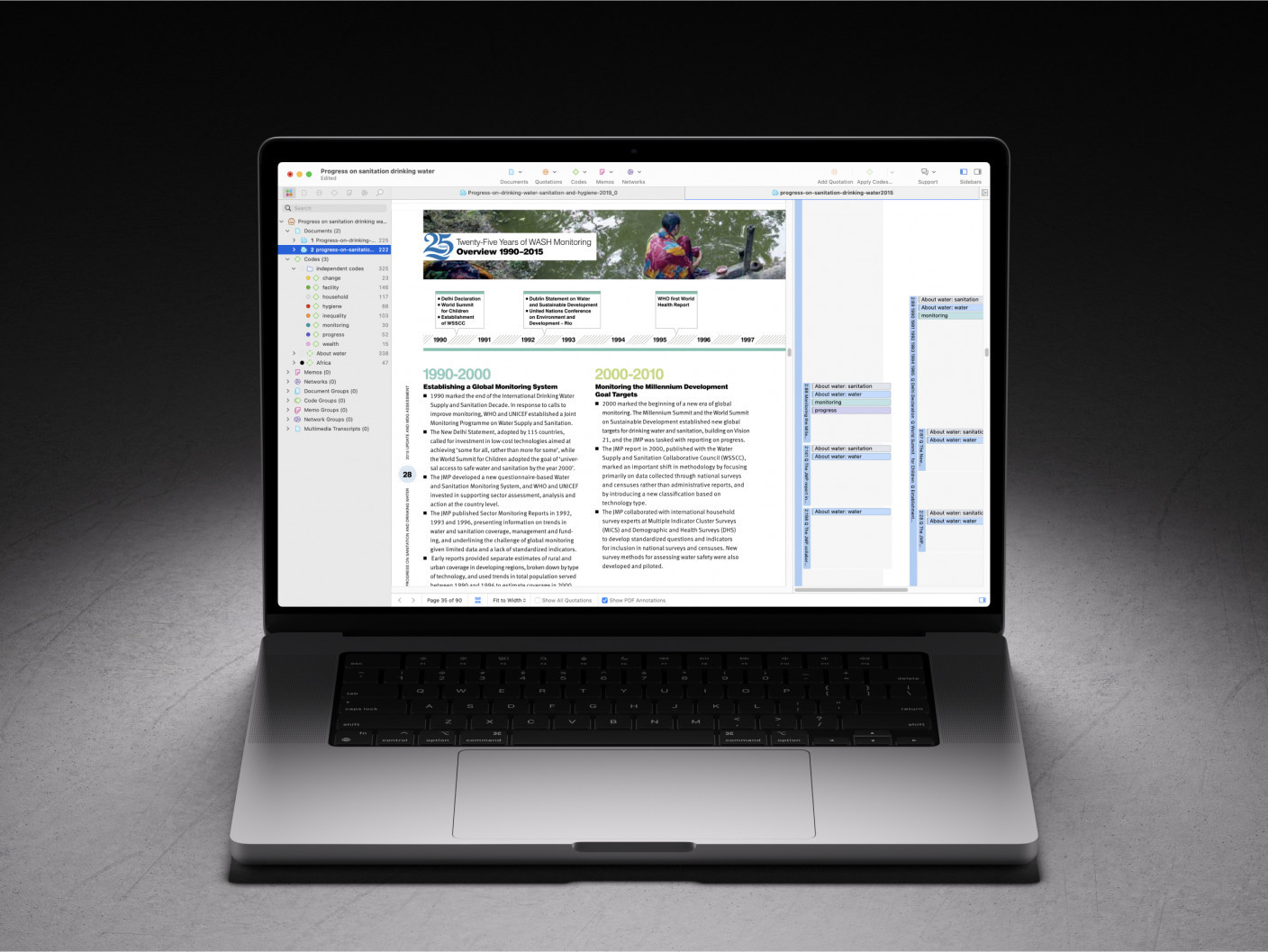Invigorate your analyses with AI-powered tools
- How can AI tools help with qualitative data analysis?
- Understand exactly what’s being said with Word Cloud
- Find all relevant data with Text Search
- Uncover all people, places, and organizations with Named Entity Recognition
- Grasp people’s reactions and emotions with Sentiment Analysis
- Discover topics, themes, or connections with Concept Search
- Deepen your insights with Opinion Mining
- Unlock innovative insights using other analysis tools
- How to cite "Invigorate your analyses with AI-powered tools"
How can AI tools help with qualitative data analysis?
Qualitative research bears great potential to unleash innovative insights, because data is collected in an open-ended manner that allows people to express themselves and talk about whatever they feel is relevant. But there is a catch: analyzing qualitative data can be very time consuming! This is simply because there is so much information present – both in terms of explicit, surface-level details as well as subtle nuances that lie behind what is being said. For a long time, it was extremely difficult to design digital technologies that could effectively automate analysis of rich data such as interviews, focus groups, surveys, comments, and other kinds of text. However, these times are now falling behind us as technology continues improving at exponential rates!
Programmers and software developers have built artificial intelligence (AI) technologies that incorporate natural language processing (NLP), and researchers can finally harness AI-driven tools to facilitate their qualitative data analysis. The ATLAS.ti AI Lab has been working long and hard to develop NLP features that work with researcher’s needs, and ATLAS.ti now offers a wide range of tools that can unlock new potentials for any methodology and any research question.
Understand exactly what’s being said with Word Cloud
The essence of making sense of qualitative data is analyzing words: What did participants talk about? What is going on in a given piece of text? The moment you have data in your hands, you can already start exploring and uncovering potential patterns with the Word Cloud in ATLAS.ti Desktop.
For example, you may have just collected survey data asking people to evaluate a video game, such as Minecraft. Even before opening and reading each person’s response, you can see exactly what was said in a Word Cloud that shows all words that appear in the text along with the frequency of each word. Use stop lists, go lists, and set thresholds to focus on what matters. From the Minecraft survey data, you can already see that participants talked mostly about feeling, thinking, people, and the word “great” came up a lot. ATLAS.ti makes it even easier to understand which words are mentioned by inferring base forms, or automatically combining all variations of the same word (such as “play”, “played”, and “playing”). If you really want to unpack precisely what is being said, you can have ATLAS.ti filter the results according to specific parts of speech. For instance, you might want to focus on only the adjectives present in the data to see how respondents described the game. In addition to seeing what everyone said, it’s also interesting to compare different groups of respondents (such as those who play the game and those who don't). The Word Cloud in ATLAS.ti can be used to search in any part of your project: documents, quotations, codes, and groups. You can also share your findings by exporting word lists and word clouds and make it easier for others to understand exactly what is being said in your data.
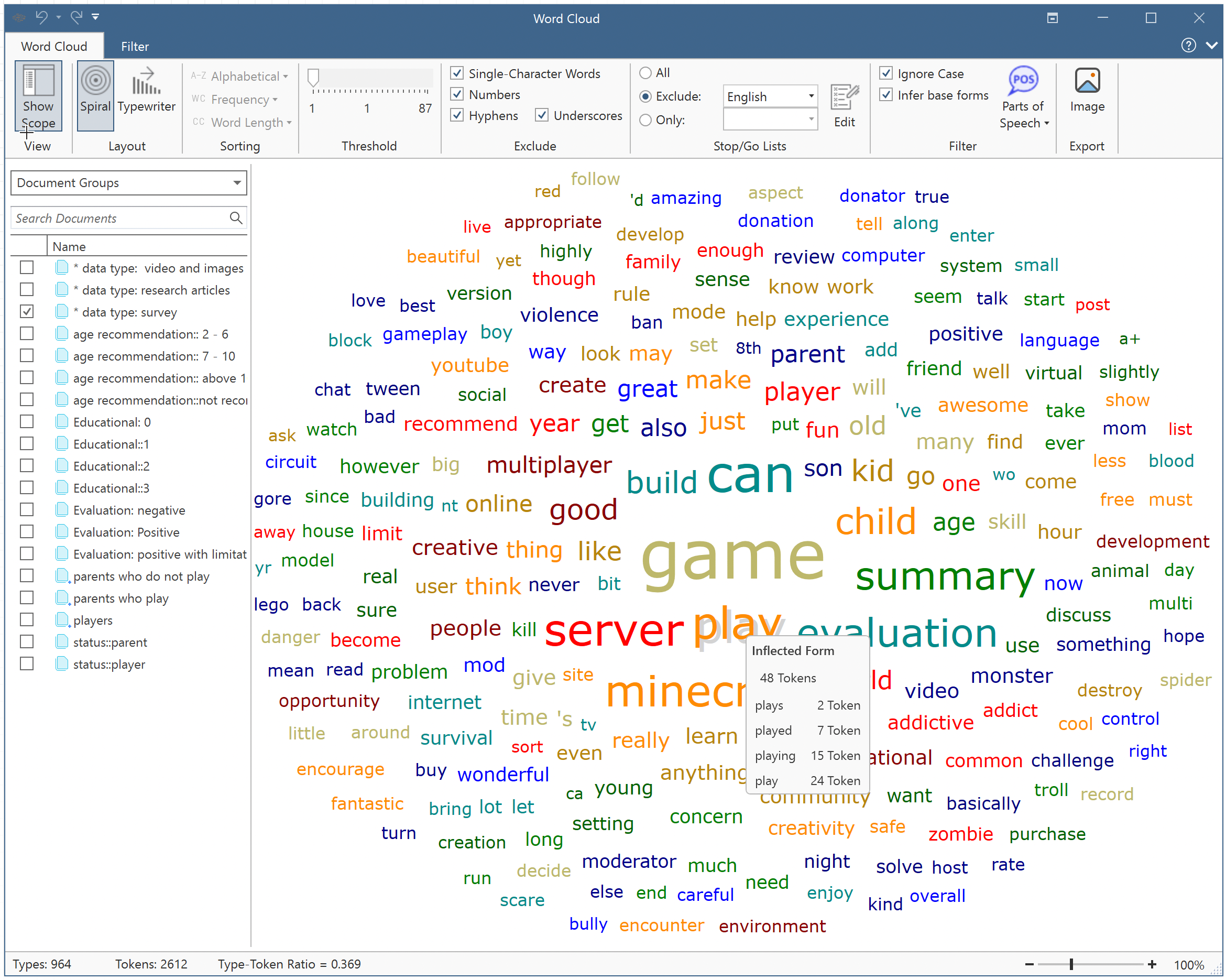
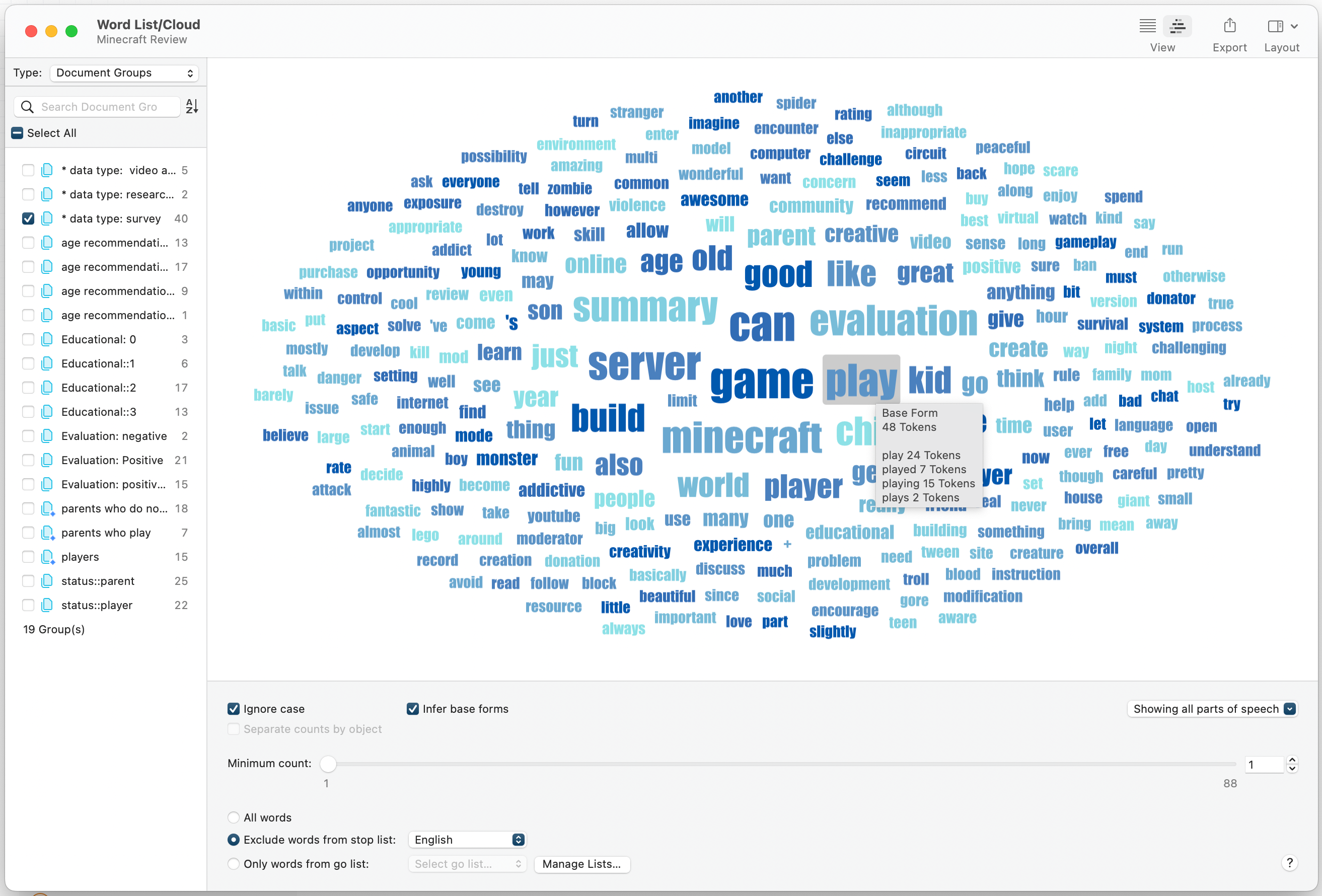
Find all relevant data with Text Search
When you want to see what is being said about a specific word or topic you’re interested in, you don’t want to spend time sifting through the entire body of text nor running the risk of missing some relevant instances! ATLAS.ti’s Text Search will go through the text for you and bring up all pieces of data with your search term – along with any synonyms and inflected forms – and you can instantly attach codes (or tags) to the results to save your findings and save your valuable time.
For example, to analyze what survey respondents said about the video game Minecraft, you might want to understand what they said about building things because this is a central feature of the game. Yet, using a simple text search would miss out on instances where respondents talked about constructing, making, or assembling things. The Smart Search incorporated in ATLAS.ti’s Text Search finds all relevant data for you by also including synonyms and inflected forms, so you don’t have to worry about missing anything. You can immediately see all the results in one list and easily attach codes. No matter how much text you have, or which words or phrases you’re searching for, Text Search can instantly capture findings that are of interest to you.
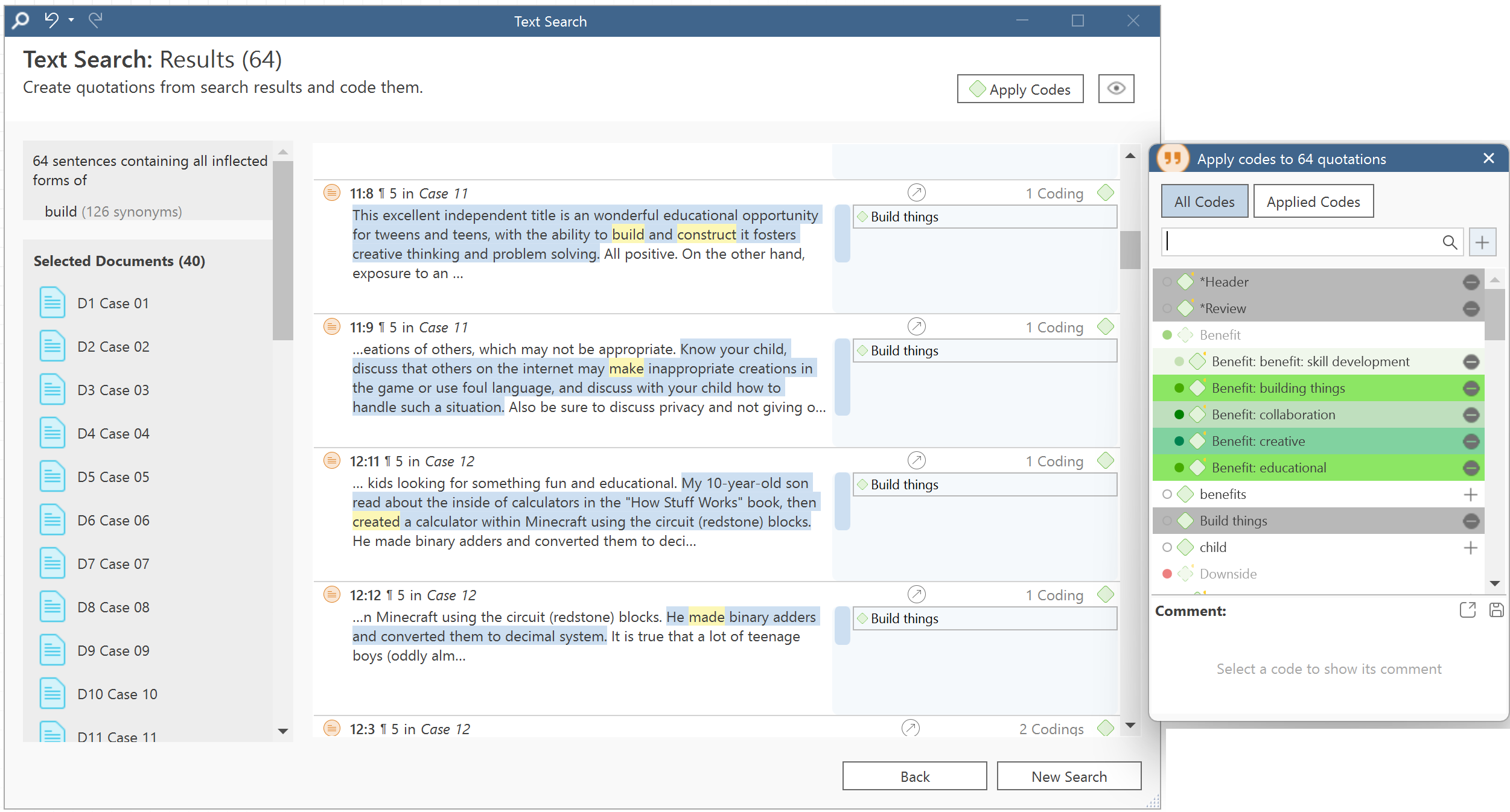
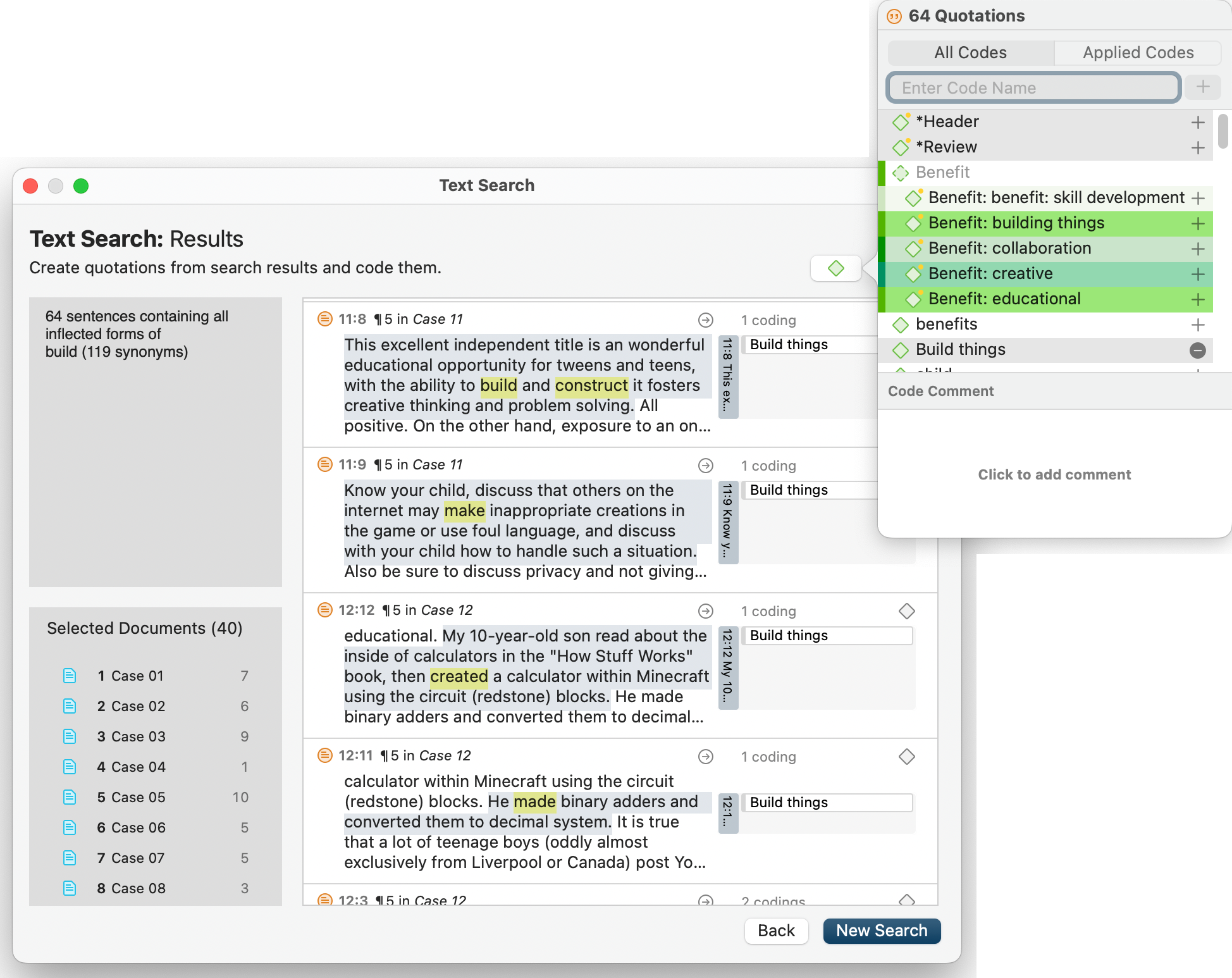
Uncover all people, places, and organizations with Named Entity Recognition
What if you want to discover precisely what people are talking about? There are probably specific people, places, or organizations that appear in your data, but you can’t possibly create an exhaustive list to search and find each one yourself. With ATLAS.ti’s Named Entity Recognition, natural language processing can instantly identify and code for all people, places, organizations, and other entities (such as works of art, languages, political parties, and more).
For example, you might be analyzing one particular entity, such as the video game Minecraft, but it’s also important to understand how participants compare this to other similar entities. Moreover, many video games have garnered large online communities and can be played on various platforms, and examining where these communities interact and play can enable you to gain deeper insights. With Named Entity Recognition, it is easy to see which consoles participants talked about, such as Nintendo and Xbox, as well as how players used YouTube to learn and share content. ATLAS.ti further enables your analysis by automatically suggesting codes for each entity that can be attached to all relevant data with one click.
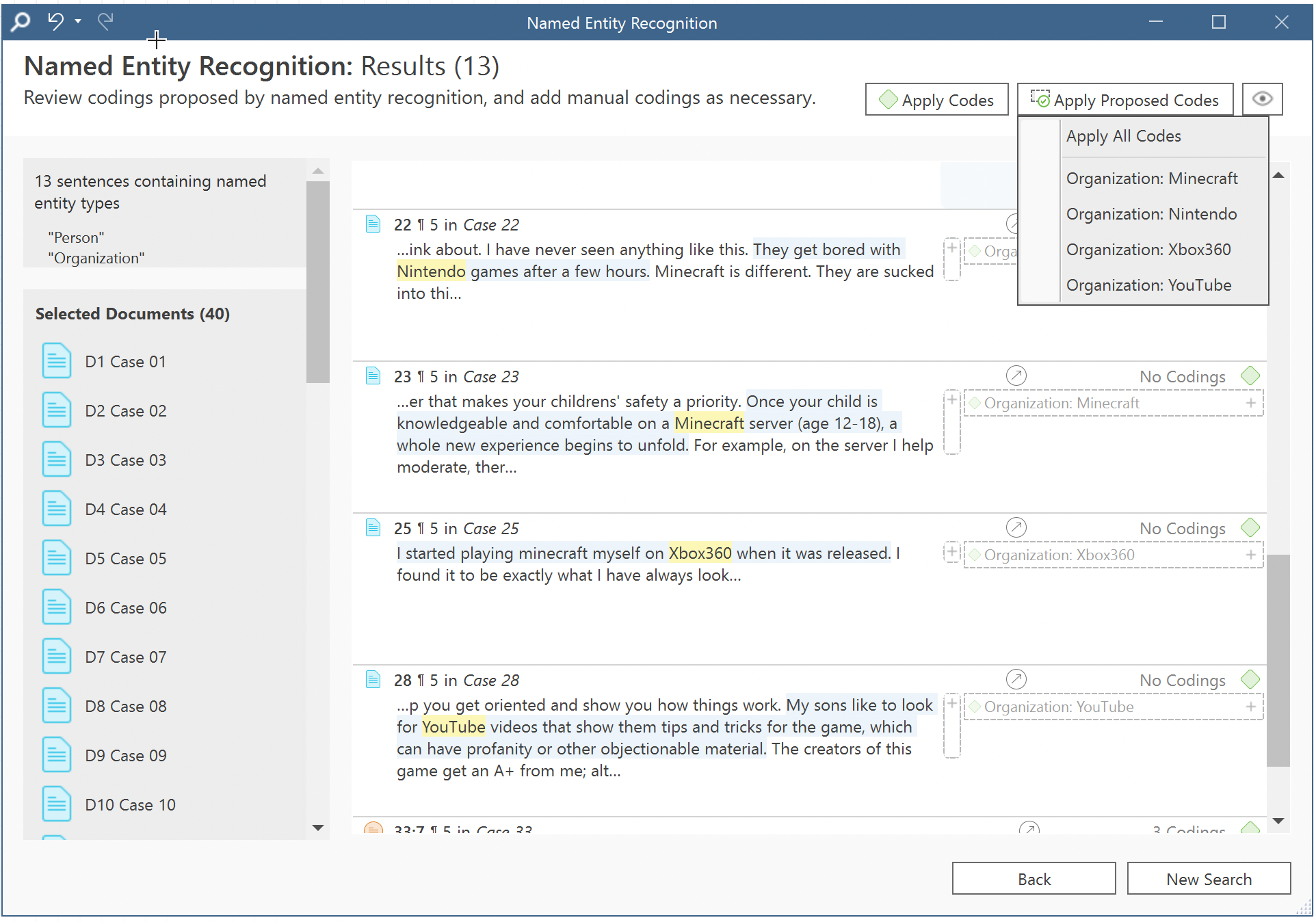
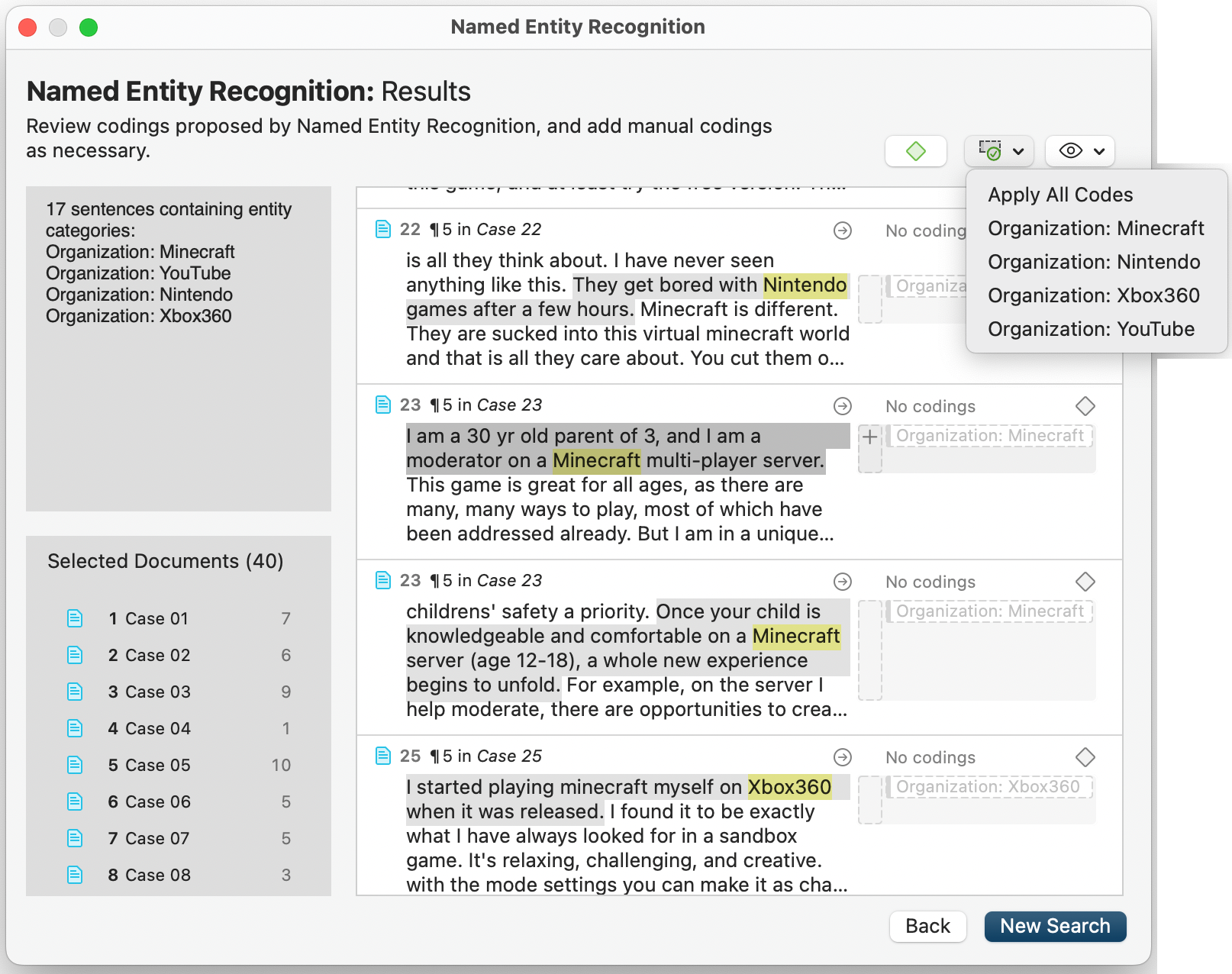
Grasp people’s reactions and emotions with Sentiment Analysis
Understanding how people feel about something is often a crucial part of analysis. When participants have the chance to express themselves in their own words, the tone with which they speak can reveal a lot about that person and deeper or more subtle patterns. ATLAS.ti’s Sentiment Analysis utilizes advanced natural language processing to automatically identify and code for any positive, neutral, and negative sentiments expressed in your data.
For example, as soon you’ve received the responses to your survey, you might want to examine how each person feels about the topic you’re studying. Sentiment Analysis makes it easy for you to dig into the reactions and feelings that came up: you can see all the results in one list and you can instantly code the findings using ATLAS.ti’s suggested codes for each of the sentiments. With one click, you can have all the feelings in your data coded, paving the way for you to explore which sentiments were predominant across participants, compare different groups of participants, and more.
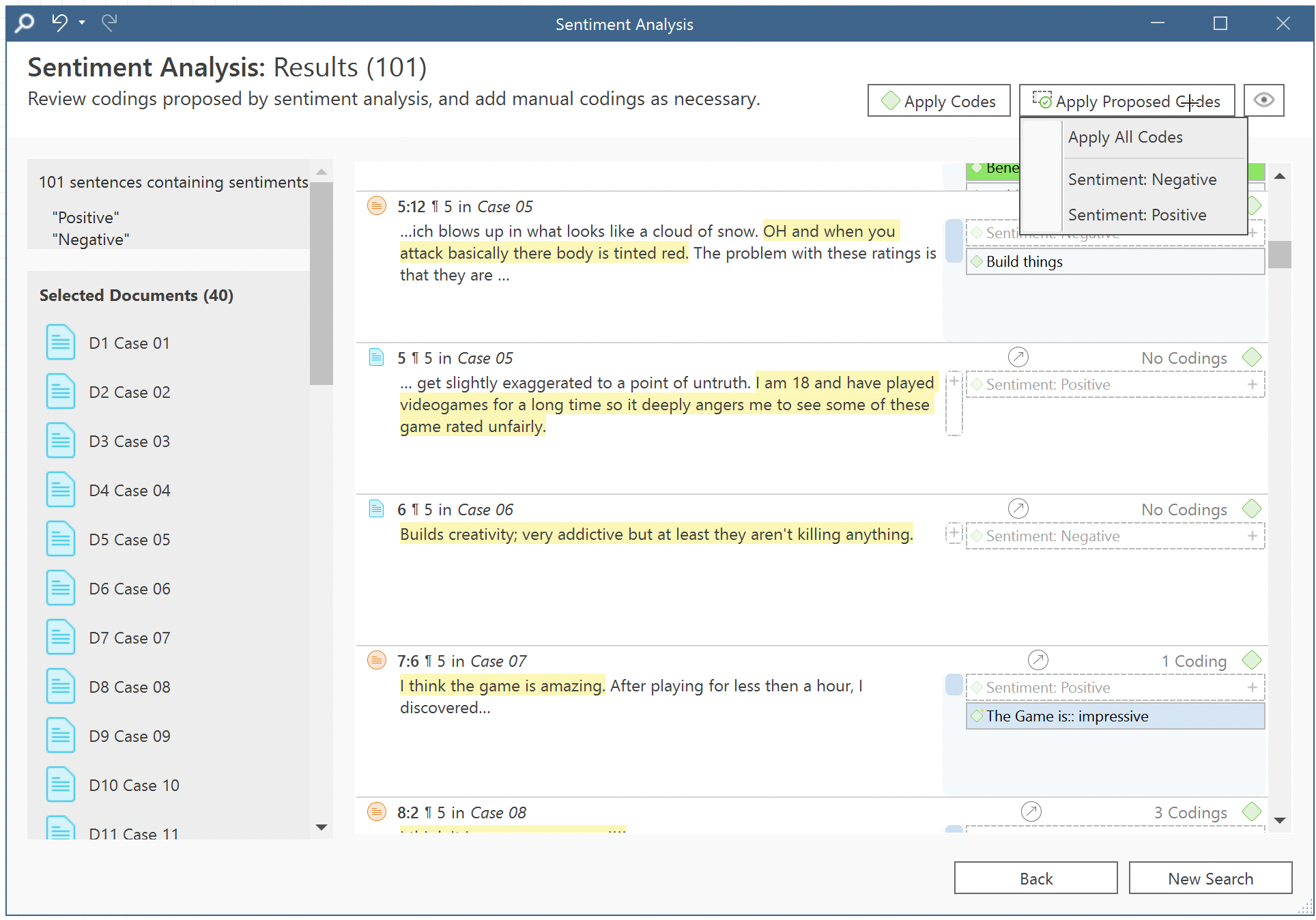
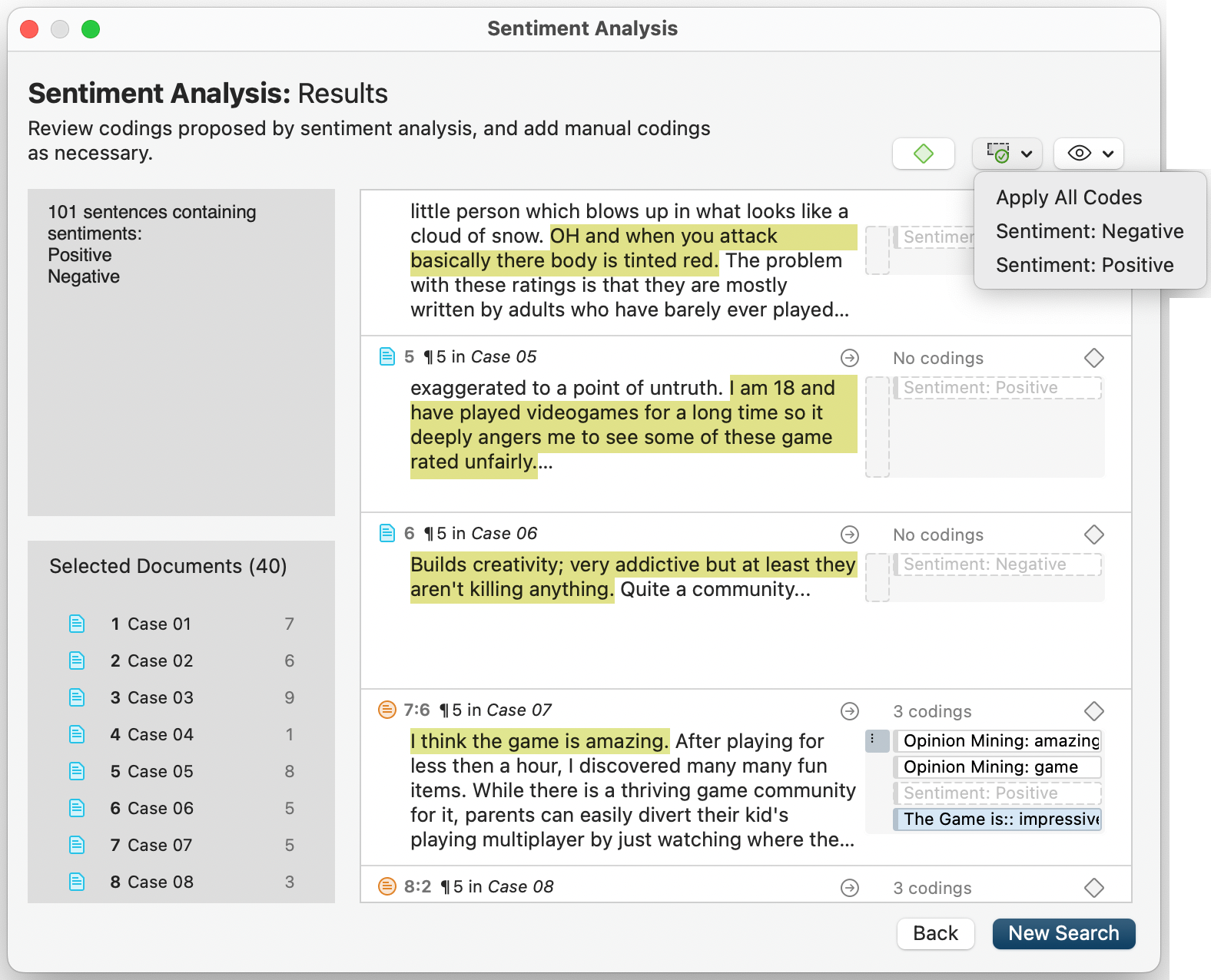
Discover topics, themes, or connections with Concept Search
Understanding what is being talked about might seem like a simple task, but it can quickly become quite complex as many nuances appear and multiple avenues for categorizing for the findings seem plausible. Identifying and synthesizing the main topics present in data is central to finding connections and patterns that can bring innovative insights. ATLAS.ti’s Concept Search can find the most mentioned nouns along with associated words in any body of text, so you can instantly code and explore potential topics, themes, or connections in your data.
For example, you might have collected various articles, reports, or webpages that you want to read so that you can learn more about your topic. Perhaps you are studying how kids and teenagers can learn from video games such as Minecraft, and you know that there are many different ways in which learning occurs. Rather than spending time sifting through all the relevant literature you gathered to identify the various approaches to learning you could examine, you can run a Concept Search and immediately see which concepts and sub-concepts are discussed across all your text, such as game-based learning, co-learning, and creative learning. You can easily see the main concepts as a word cloud or word list, then click on any concept to see all the sub-concepts and exact segments of text. This allows you to instantly engage with the information in your text and extract deeper insights, because you can easily see overarching patterns and zoom in to examine exactly how these patterns are expressed and weaved together. With one click, you can attach ATLAS.ti’s suggested codes to the concepts or sub-concepts of your choice, allowing you to instantly code for the details and focus on patterns that can shed light on the questions that matter to you.
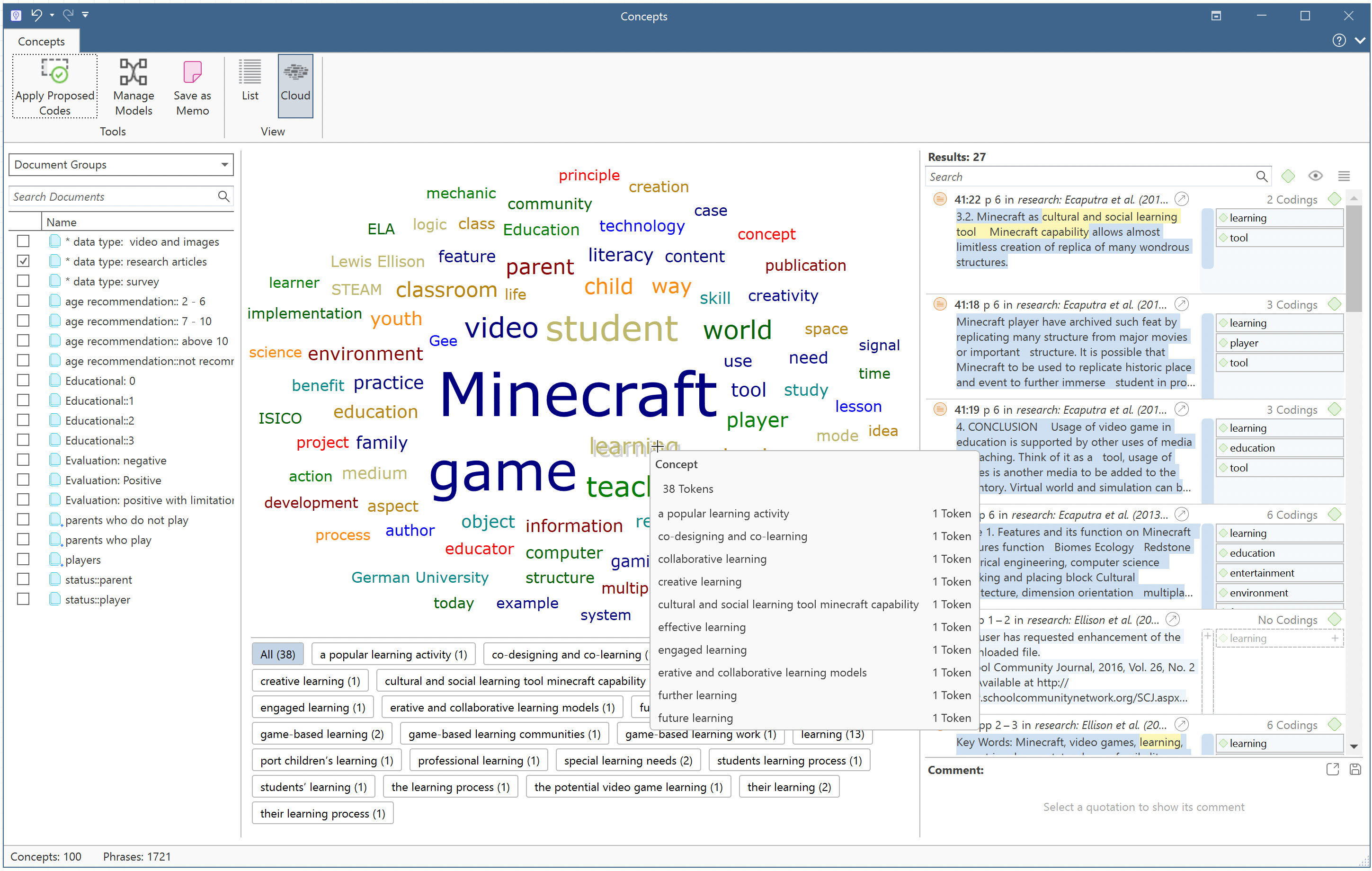
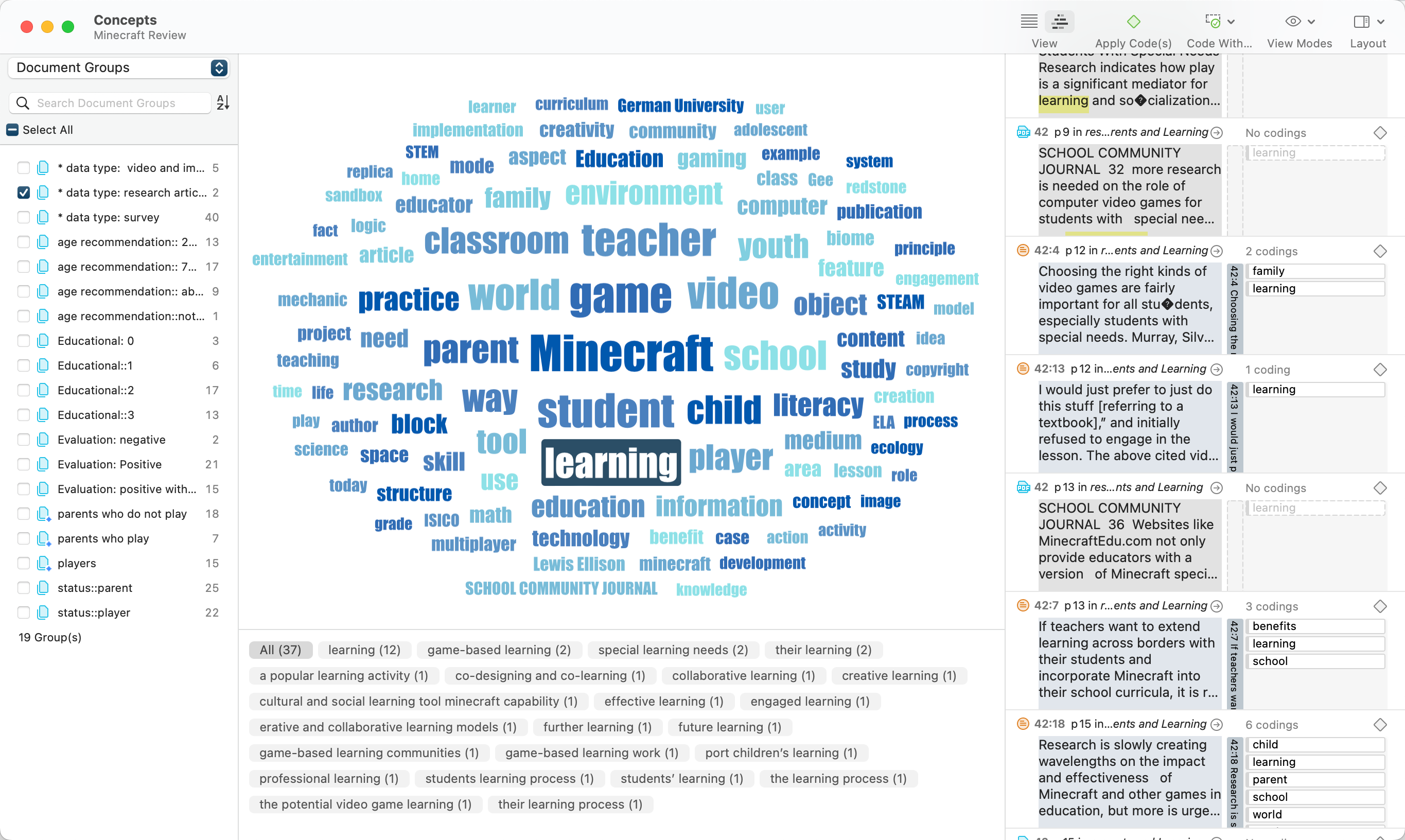
Deepen your insights with Opinion Mining
When people are asked open-ended questions, the possibilities to express opinions about different topics are virtually endless. It’s certainly important to understand what people are talking about, but it’s equally valuable to grasp how people feel about these different things: Do they like it or dislike it? Do they agree or disagree? Explore the opinions in your data and gain deeper insights.
For example, as soon as you’ve received responses to your survey, you’ll probably be interested in seeing what opinions were expressed. With ATLAS.ti’s Opinion Mining, you can instantly see both what is being talked about and whether each topic or concept is viewed positively or negatively. Colorful bar charts make it easy to understand the opinions in your data, and you can click to see the data behind each opinion. If you’re analyzing what parents say about the video game Minecraft, you can instantly see what was liked and disliked about the game. Automatically attach codes suggested by ATLAS.ti to save your findings, and you can just focus on building your analysis.
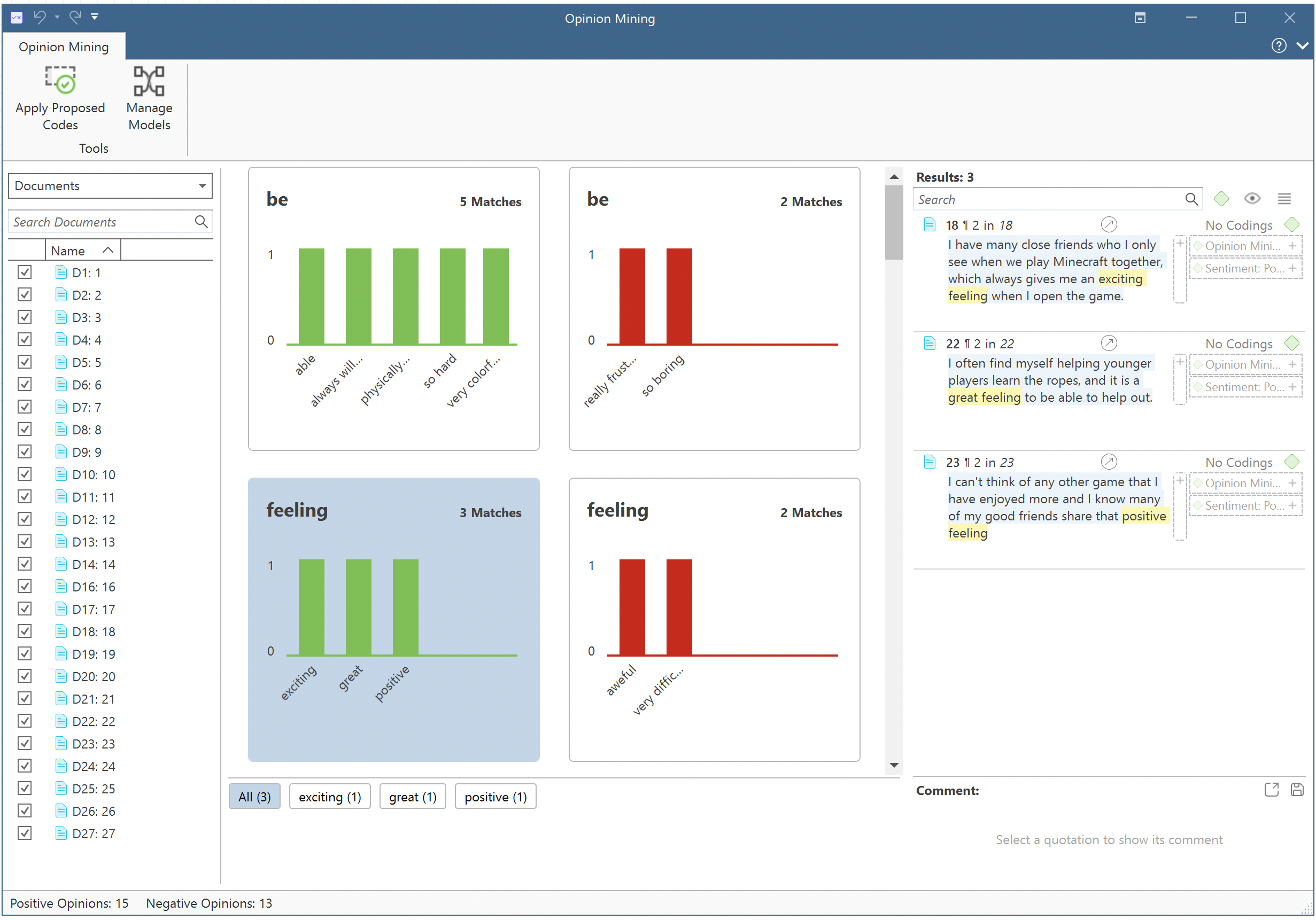
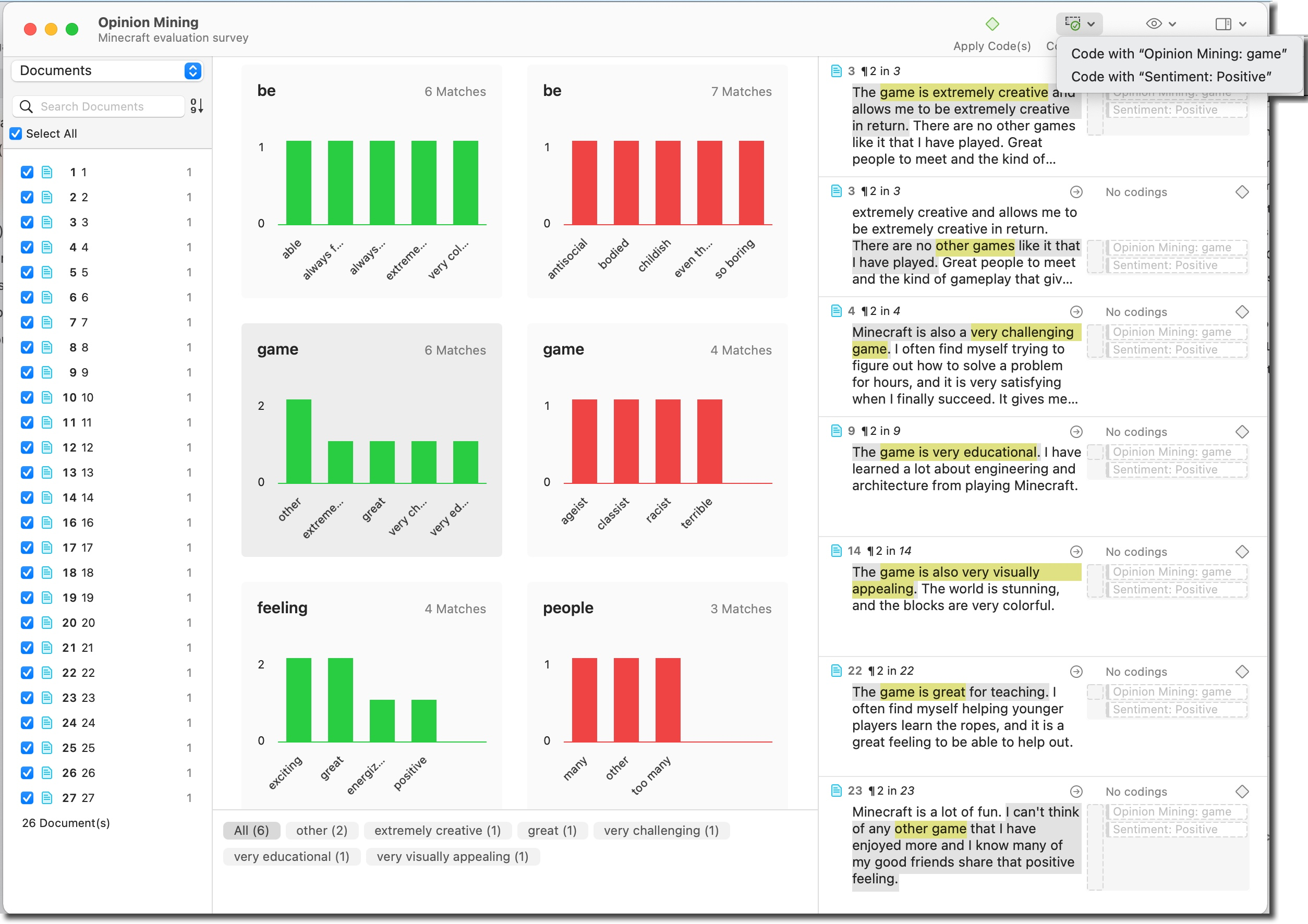
Unlock innovative insights using other analysis tools
The ATLAS.ti AI Lab has developed powerful tools that can automatically search, filter, and even code any text you want to analyze. Attaching codes to relevant segments of data is often the most time-consuming part of analyzing qualitative data, but thanks to developments in artificial intelligence and natural language processing, you can code your data in minutes, not days.
Once you have your data coded, you can easily query it and continue digging deeper in all sorts of ways with ATLAS.ti’s other features. You could examine which feelings were expressed regarding different entities using the Code Co-occurrence Table, or compare opinions of different groups of participants using the Code-Document Table. Export different kinds of outputs, such as tables, spreadsheets, word cloud images, networks, and Sankey diagrams to present your findings with appealing visuals that will effectively convey your point to your audience. These AI-driven tools are here to facilitate your analysis, helping you identify and code relevant data, and you can count on the ATLAS.ti software, learning resources, sample projects, and the ATLAS.ti support team to help you explore emergent patterns and develop meaningful insights.
How to cite "Invigorate your analyses with AI-powered tools"
APA (7th edition)
Kalpokas, N. (2020). Invigorate your analyses with AI-powered tools. ATLAS.ti Research Hub. https://atlasti.com/research-hub/invigorate-your-analyses-with-ai-powered-tools
MLA (9th edition)
Kalpokas, Neringa. “Invigorate Your Analyses with AI-Powered Tools.” ATLAS.ti Research Hub, 2020, https://atlasti.com/research-hub/invigorate-your-analyses-with-ai-powered-tools.
Chicago (17th edition)
Kalpokas, Neringa. “Invigorate Your Analyses with AI-Powered Tools.” ATLAS.ti Research Hub. 2020. https://atlasti.com/research-hub/invigorate-your-analyses-with-ai-powered-tools.


